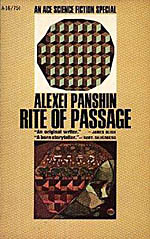
![]() Tar Daddoo
Tar Daddoo
12/21/2014
![]()
What is the Science Fiction Premise?
In Rite of Passage Earth was destroyed in the population wars. The only survivors are the colonists who were ferried out to Earth-like worlds and the scientists and technologists who ran the faster-than-light colony ships. The colonists were mostly peasants because they would have the best chance of making a life from whatever was at hand on the new planets. Now, hundreds of years after the destruction of Earth, the occupants of the ships have created a society around traveling from planet to planet bartering the fruits of their technology for the raw resources of the planetary colonists.
Is the science of the premise explored?
This separation of society into peasants and a technological elite is presented primarily from the viewpoint of the technologists. We learn why the scientific elite on the ships prefers the separation. We also learn about the many ways in which the society and its politics have shifted to deal with the albeit spacious confines of the ship. (The ship is actually a hollowed-out asteroid with very effective artificial gravity. There is a lot of space, but it is bounded.)
Is the impact of the premise on an individual explored?
The story is told through the eyes of Mia Havero, a girl of twelve when we first meet her, who must face the "Trial" when she becomes fourteen. The Trial is a one month survival test that all adults on the ship must pass. It is known to be dangerous; not everyone survives.
Through her two years leading up to the Trial, the Trial itself, and the immediate aftermath we learn about ship-board society and how Mia feels about it. She is a product of this world and it shows.
Is the impact of the premise on society explored?
The tension between the ship-dwellers and the colonists is a constant backdrop for Mia's discovery of life on her ship. In the beginning it seems rather unimportant, since she is only really concerned about the ship. Slowly, as she grows older, the relationship with the colonists becomes more apparent.
How well written is the story?
The book is well-written and easy to read. There were a few times when the dialog felt stilted, but these passed as I became more involved in the story.
The two things that gave me a bit of trouble were the personality of the protagonist and the ending. I found Mia a bit difficult to embrace because she seemed unruly, opinionated, and generally obnoxious. In retrospect, I forgive the author, since Mia's personality was part of the point. Nevertheless, it took a bit longer to warm up to the story.
As for the ending, all I will say is that it is difficult. When I feel it is integral to the story, it seems brilliant. When I feel it is grafted on, I am annoyed. I still haven't decided which it is.
Can I recommend the book?
I'm not sure this book will appeal to everyone. Mia is hard to like. Moreover, sometimes the story seems rather aimless as the author uses Mia's actions to reveal life on her ship. In the end, as Mia grows up, I began to understand her world and her choices. By the time the Trial began, I was definitely in her court.
Having said that, I am inclined to recommend Rite of Passage. I admire the author's unflinching eye as he paints a plausible society. He is not asking us to love it, just to understand its rules, why they exist, and what their consequences might be.